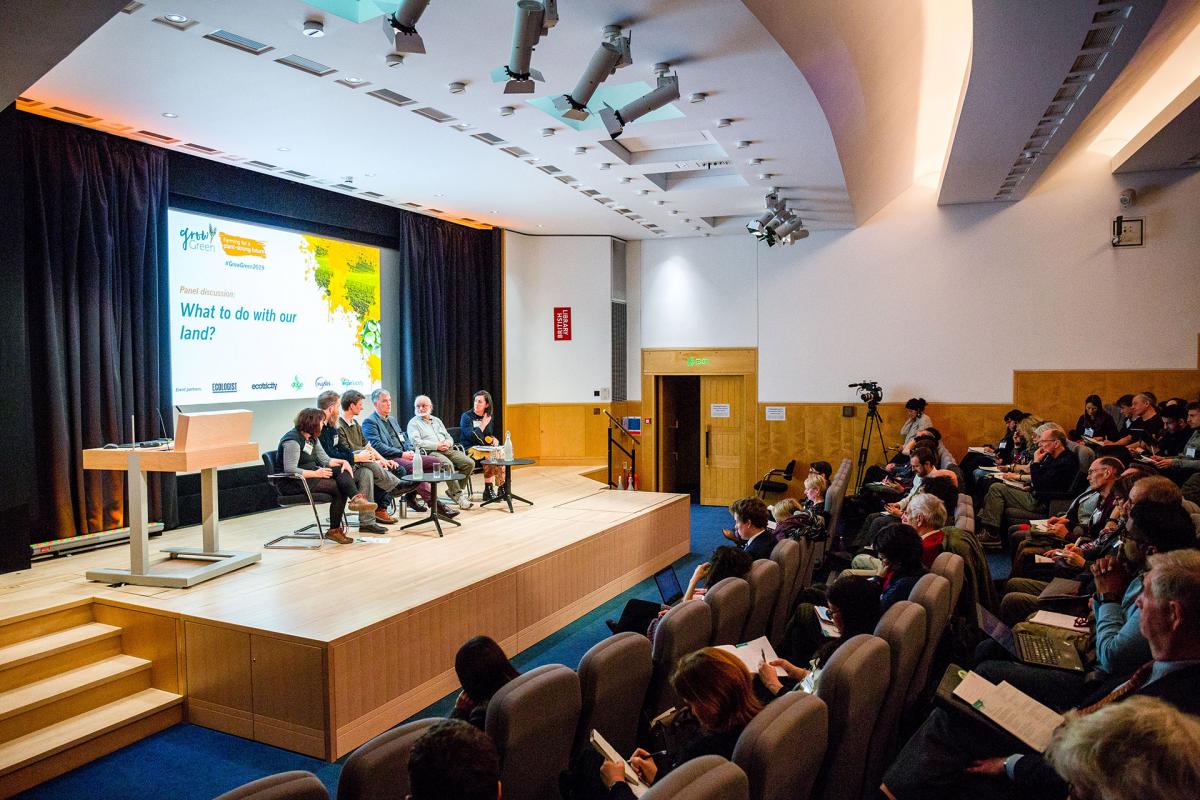What does farming look like in a plant-based future? Anyone who has spent any time looking at the modern food system will appreciate its incredible complexity.
Knotty issues abound, embedded in a challenging set of politics, accompanied by all sorts of difficult practical problems; the sheer scale and complexity of the challenge of moving to a more sustainable and ethical plant-based food future can seem overwhelming.
But in the spirit of dealing with that complexity, several hundred people gathered at the British Library in London on 11 April at the behest of The Vegan Society, for a day of thought-provoking speeches and panel discussions on the transition towards plant-based diets, and the implications for agriculture and rural communities.
There was an incredibly diverse lineup of speakers, from a Texan former cattle rancher to academics from Oxford and Harvard; from the UN’s Food and Agriculture Organization to a host of food and environmental NGOs, business voices, think tanks and journalists (the full lineup is here). Over the course of three keynote speeches and six panel sessions, speakers covered everything from national land strategies to the practical challenges of transitioning from animal to plant-based agriculture, via the merits of pulses, and the growth of plant-based foods in mainstream retailers. Below is my perspective on some of the recurring themes of the day, and things that will need to be revisited as the conversation progresses.

Image: Stephen Bingham
Advocates for more sustainable agriculture – vegans included – need to engage more, and better, with farmers and rural communities.
One of the most refreshing aspects of the day was to hear from active farmers about the practical and personal challenges they face, and their perceptions of the broader debate around sustainable and ethical food systems.
Farmers, and the rural communities of which they are part, depend on farming for their livelihoods, and as we were reminded, farming is inescapably a commercial enterprise. But as former livestock farmer Jay Wilde put it, farming is also an immersive lifestyle: for children raised on farms among the legs of animals, what they see around them (including animal agriculture) is “just what you do”. As others suggested, a failure to appreciate farming on its own terms may result in alienation of the very group of people to whom we collectively need to listen, and from whom we need to learn if we want to explore the practical issues surrounding agricultural transitions.
Farmers who do choose to transition away from animal agriculture face personal challenges, not only in practical and financial terms, but also culturally and in their personal and familial relationships – a reality brought home by several of the panellists. Too often there are feelings of mutual embattlement on different sides of the conversation, in response to which several speakers repeated a simple message: keep outreach and activism positive.
We need a more coherent vision of what a good food future looks like: while the diversity of views on display was certainly one of the strengths of the day, that diversity also highlighted one of the major challenges as we look forward.
People do not agree on what ‘good’ looks like. Over the course of the day we heard about agroecology, we heard about local food and shortened supply chains, we heard about conventional and organic farming techniques, the importance of horticulture, seasonal eating, the potential role for market gardens, the respective roles of whole foods and processed foods, competing views about the place of animal agriculture, and more.
It is of course unlikely that all differences in perspective will be reconciled, but the absence of a sufficiently coherent and shared vision of the future makes talking about the practical challenges of the transition to that future quite difficult. This is all the more significant because, as most people in the room seemed to agree, we need to be taking practical steps now.
We need to talk about land use.
Speakers returned throughout the day to the theme of land use strategies, including to point out that we don’t have one in the UK; in the words of Friends of the Earth’s Guy Shrubsole, we are “land use illiterate” as a nation (as illustrated by the disquieting statistic we have ten times as much land given over to golf courses as to allotments).
So what proportion of our land should be given over to agriculture? And on that land, what kind of agriculture are we going to be practising? One answer came from Harvard’s Dr Helen Harwatt, who presented her new research on the topic, advocating a mass reforestation exercise and wide scale shift towards plant-based agriculture in order to get us back on track to meeting our climate targets under the Paris Agreement. Daniel Raven Ellison also presented a short film which gave an aerial overview of the UK, with one second of film per one percent of land type - highly recommended viewing for anyone with literally a couple of minutes to spare.
Many people are sceptical about the capacity of our current political institutions to drive change.
There was a sense of frustration voiced by speakers and audience members alike about the difficulty of influencing policy in more sustainable directions, with some – notably former Green Party leader Natalie Bennett – suggesting that our current system of politics is not up to the task and is in desperate need of reform.
For some speakers this means we need to build movements from the bottom up, in which ordinary people – including farmers – come together to push for change. For others it was more about smart and opportunistic engagement with politicians. The practical politics of change is clearly a topic that needs tackling.
The plant-based dietary trend is real and substantial, but people are wary of ‘junk food veganism’.
Chantelle Adkins of The Vegan Society’s trademarks team related their feeling of excitement at the sheer range of products achieving the trademark standard – not just “token” products, but representing “real product development”. Meanwhile, research described by Carina Perkins of The Grocer magazine indicates that the huge sales growth in plant-based products is being driven by the growing number of mainstream ‘flexitarians’ supplementing their diets with these new products, rather than vegans. But while we might welcome growing numbers of flexitarians eating more plant-based foods, she also pointed out that these consumers may be the first to drop them if prices rise.
There were also some cautionary notes sounded about the more heavily processed plant-based products finding their way onto supermarket shelves – ‘junk food veganism’ came in for a bashing from several quarters over the course of the day, including as a possible reputational risk for the broader vegan movement.
Money matters and change requires funding.
This might seem a trite observation, but it is surely one of the most important practical factors. Speakers repeatedly brought up the inadequacies of the current agricultural subsidies framework, arguing that it does not work in favour of the outcomes we need, even in such basic areas as promoting domestic fruit and vegetable growing.
There was some cautious optimism about the direction of travel suggested by the UK’s draft Agriculture Bill, which will replace direct payments under the Common Agricultural Policy with a new system labelled “public money for public goods”, although of course much of the operational detail of that framework remains to be seen.
Furthermore, if we want to explore the broader possibility for a diverse UK plant-based agriculture, we will need research into the types of plants that we can grow, and how we can grow better (and more of) the wealth of things we already do grow. And lest anyone be under any illusions as to to the costs of transitioning farms away from animal agriculture, one livestock farmer in the process of transitioning to plant-based production revealed that even as a smallholder with a relatively small herd his decision had cost him personally in the region of £10,000.
Lastly, complexity necessitates systems thinking.
As is clear from the wide ranging nature of the conversation, the food system is complex, and cuts across multiple social and political domains. Meaningful change depends on us engaging with that complexity, and working through knotty problems.
Several speakers reiterated this message over the course of the day: we need to think about these issues together, as difficult as that may sometimes be. We need to think simultaneously about climate change, ethical food choices, public health, land use, consumer choice, social inequality, and more. Thankfully, the event itself provided evidence of some of this joining up happening – a trend that clearly needs to be continued.

As The Vegan Society’s Louise Davies observed in her programme notes for the day, British agriculture is a political, and often emotive subject, and there was plenty of evidence of this throughout the day. But the constructive debate between groups of people who didn’t all necessarily agree about the way forward was testament to the value of these kinds of events, and it was very welcome to see The Vegan Society facilitating what is clearly just the start of a much bigger conversation.
It is impossible to do justice to the breadth of the day’s contents in just a few hundred words, and we also saw discussions on topics as diverse as the use of music in urban food outreach programmes, the production of green energy, our woefully low levels of fruit and vegetable consumption, the role of climate change in causing drought, and more.
But in the spirit of ending optimistically, and as Natalie Bennett argued passionately in her keynote speech, there is nothing inevitable about the outcomes here: history teaches us that things can change, and when things do change, they are liable to change quickly.
By John Andrews
The views expressed by our bloggers are not necessarily the views of The Vegan Society.

